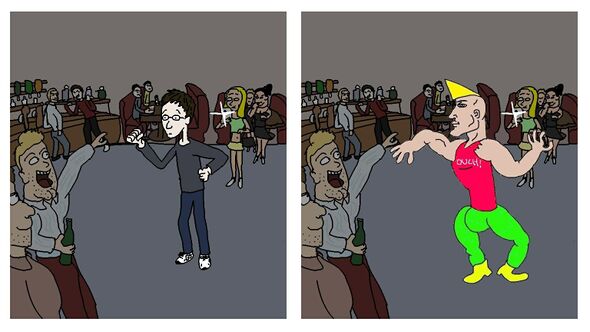Halo effect
The halo effect is a theory that posits that various positive traits also increase the (false) impression of other positive traits. E.g. people who are more aesthetically attractive are subconsciously assumed to have a much more virtuous personality and to be much more healthy and to have much higher IQ, none of which is true (see also Beauty § Correlations).[1] The halo effect also goes into the implications of such a subconscious stance, such as the subsequent greater career prospects that better looking people get. The opposite of the halo effect is the horn or failo effect.
Forgiving the beautiful[edit | edit source]
Halo effect allows attractive people to get away with violating any and all social norms, also any negative and or androgynous qualities they may have are over looked, as in literally not noticed or forgiving (see Jeremy Meeks). No one questions Stacy's sexuality despite her strong jawline, and determined attitude, nor Chad's sexuality despite having huge duck lips, and dancing around in a multi colored jumpsuit, but if an incel guy were to wear the exact same outfit, the incel guy would be labeled as gay immediately.
White Damsel in Distress Syndrome[edit | edit source]
The White Damsel in Distress Syndrome or WDDS for short is a subtype of the halo effect focusing on pretty young white women. The intricacies of the WDDS syndrome is most apparent when a person fitting such an archetype goes missing in a missing person's report. Many anthropologists have noted the phenomenon of a disproportionate amount of media coverage afforded to women befitting this stereotype. In this sense, WDDS aligns with halo effect in that immutable fundamental traits inherent to a person determines sympathy. In the case of WDDS, even if all other factors are the same, there is a sympathy surge with the White Damsel afforded sympathy due to good looks, being young, being middle class, and being of the female gender and being white. This shows that WDDS alongside halo effect demonstrates an inherent bias wherein sexism, ageism, skin colorism or racism, classism as well as lookism are mainstream within western society. If this is not the case, then why is it that in missing person's cases, such a disproportionate level of media attention is afforded to individuals who are young, attractive, white, female and upper middle class? As such, WDDS is the ultimate litmus test for the existence of the halo effect.[2]
Vanishes with more acquaintance[edit | edit source]
The better one knows someone, the less halo effect plays a role. For example, after a while teachers can guess their academic abilities as accurately as a standardized achievement test.[3] This means the halo effect probably is playing a greater role in a more anonymous society with more fleeting acquaintances rather than deep friendships.
Memes[edit | edit source]
See also[edit | edit source]
References[edit | edit source]
- ↑ https://incels.wiki/w/Scientific_Blackpill#Attractive_people_are_perceived_much_more_positively_than_they_really_are
- ↑ Foreman, Tom (March 14, 2006). "Diagnosing 'Missing White Woman Syndrome'". CNN.
- ↑ https://journals.sagepub.com/doi/abs/10.3102/00346543059003297
